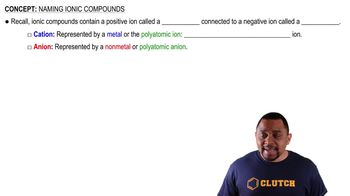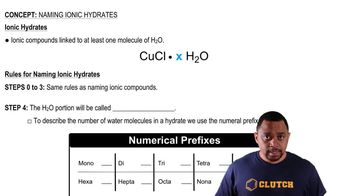Textbook Question
Write net ionic equations for the reactions listed in Problem 4.72.

 Verified step by step guidance
Verified step by step guidance



Predict whether a precipitation reaction will occur when aqueous solutions of the following substances are mixed. For those that form a precipitate, write the net ionic reaction. (a)
Predict whether a precipitation reaction will occur when aqueous solutions of the following substances are mixed. For those that form a precipitate, write the net ionic reaction. (b)
Predict whether a precipitation reaction will occur when aqueous solutions of the following substances are mixed. For those that form a precipitate, write the net ionic reaction. (c)